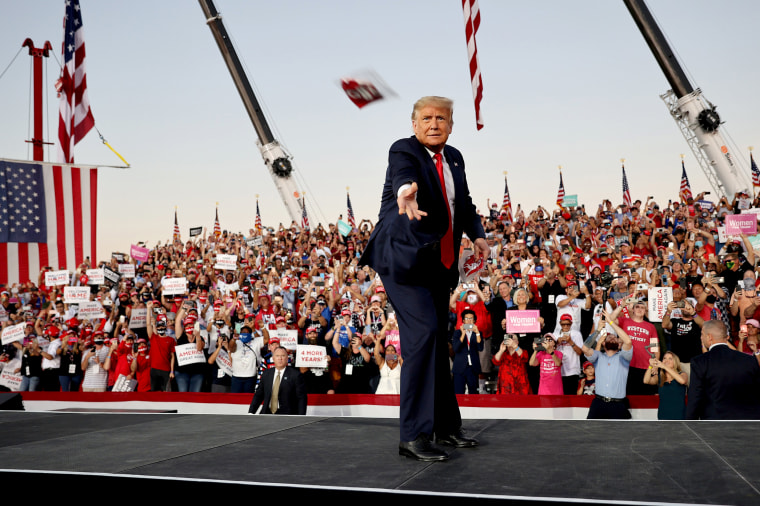During his townhall event on ABC News last night, Joe Biden made the case that Republicans made a mistake slashing the corporate tax rate. Describing the current landscape, the former vice president explained, "You have 91 out of the Fortune 500 companies not paying a single solitary penny" in corporate taxes.
This, incidentally, had the benefit of being true.
Around the same time, during his townhall event on NBC News, Donald Trump was reminded that many Americans "think that corporations don't pay their share of taxes and want to see those tax rates increase." Offered a chance to defend his policy, the president insisted that job growth has soared during his term "because of the tax rate."
Part of the problem with the response is that job growth under Trump really hasn't soared at all. As we discussed yesterday, even removing the coronavirus pandemic from the equation, the fact remains that fewer jobs were created during Trump's first three years than during Obama's last three years.
But let's also not overlook a detail the president neglected to mention during last night's event: he's actually inclined to give corporations another tax cut. Indeed, as Marketwatch noted, the Republican said as much earlier in the day.
Trump while on Fox Business touched on the potential for tax cuts if he wins a second term, saying he may aim to lower the U.S. corporate tax rate to the "even number" of 20%, down from the current 21%.
This is notable for a few reasons.
First, given how little the 2020 presidential race focuses on policy, it was a treat to see a meaningful, substantive difference between Trump and Biden come to the fore: the Republican incumbent believes corporations should get yet another tax break; his Democratic challenger believes they should pay more.
Second, Trump's case is a much tougher sell. As regular readers may recall, the New York Times took a closer look late last year at the effects of the Republican tax breaks and found that the GOP plan delivered a "windfall for the world's largest corporations," which ended up with tax bills "even smaller than what was anticipated when the president signed the bill."
And as Biden noted, many corporations aren't even paying taxes at the current rate. The Institute on Taxation and Economic Policy released a detailed study in 2018 that found of the Fortune 500 companies, about 400 paid an average tax rate of about 11% -- roughly half of the current rate of 21% -- thanks to a series of loopholes and giveaways Republicans made no effort to address, and plenty of corporate giants aren't paying any federal taxes at all.
But let's not brush past how the president framed his policy preference: Trump believes lowering the corporate tax rate from 21% to 20% would leave businesses with an "even number."
The question, of course, is why it would matter whether the rate was an odd or even number.
If this sounds at all familiar, I noted in my book (see chapter 2) that during the 2017 fight over tax policy, the president preferred tax rates that were multiples of five -- 10%, 15%, etc. -- not for any substantive reason, but because Trump simply thought those numbers sounded nicer.
As the Washington Post reported a few years ago, the president specifically told GOP negotiators, in reference to the corporate tax rate, "Twenty is a pretty number."
Nearly three years later, Trump appears to be thinking along these same lines.

